Contract Law Assignment: Car Sale, Mortgages, Land and Leases
VerifiedAdded on 2022/11/14
|7
|1695
|52
Homework Assignment
AI Summary
This contract law assignment analyzes a case of breach of contract involving a car sale, exploring the elements of a contract, anticipatory breach, and relevant consumer protection laws like the Competition and Consumer Act. The assignment also delves into chattel mortgages, defining them and outlining the legal framework, including perfection. Furthermore, it defines fixtures and examines the Torrens land registration system and leasehold agreements. The solution provides a comprehensive overview of contract law principles, legal concepts, and their practical application in a real-world scenario, supported by relevant case law and legislation.
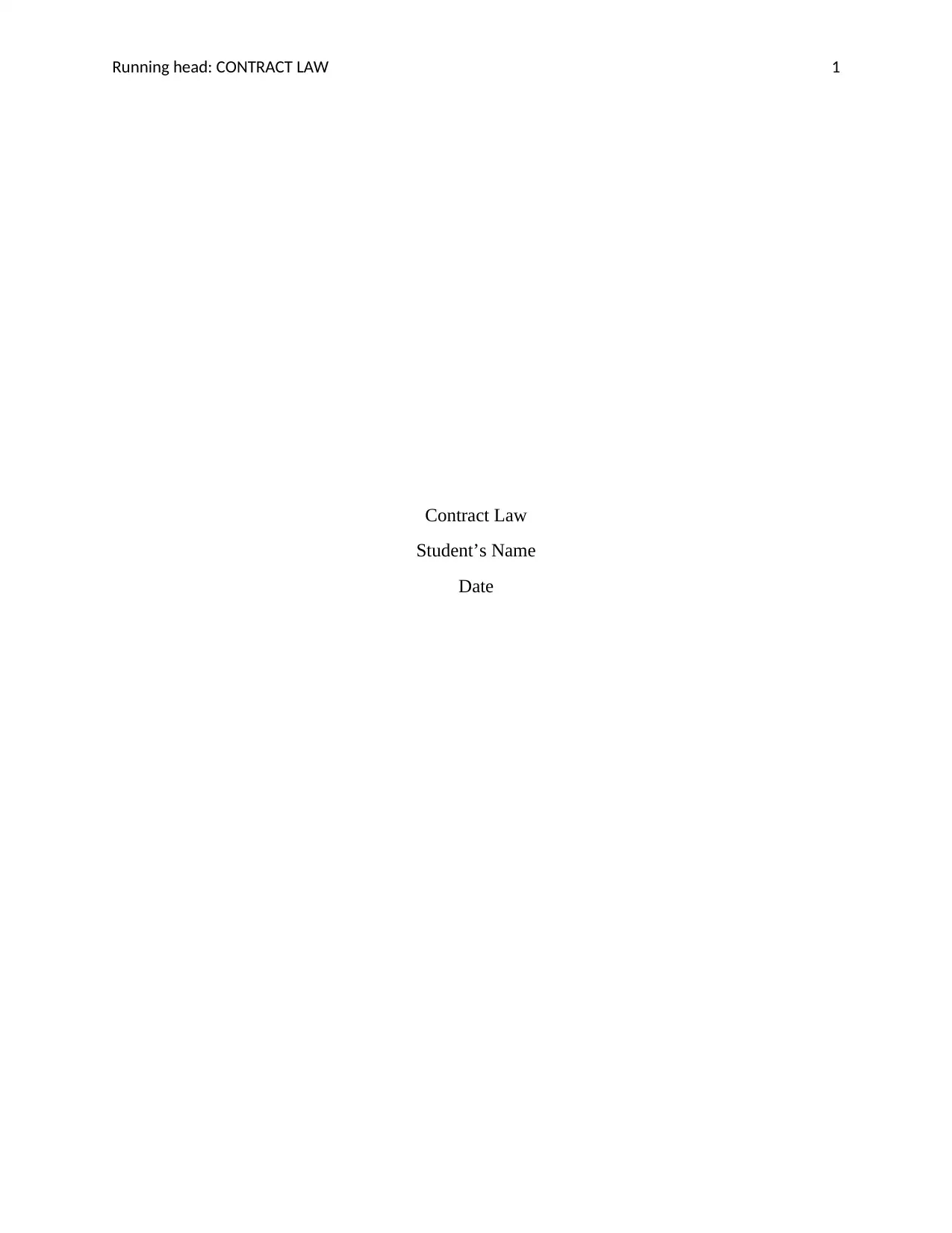
Running head: CONTRACT LAW 1
Contract Law
Student’s Name
Date
Contract Law
Student’s Name
Date
Paraphrase This Document
Need a fresh take? Get an instant paraphrase of this document with our AI Paraphraser
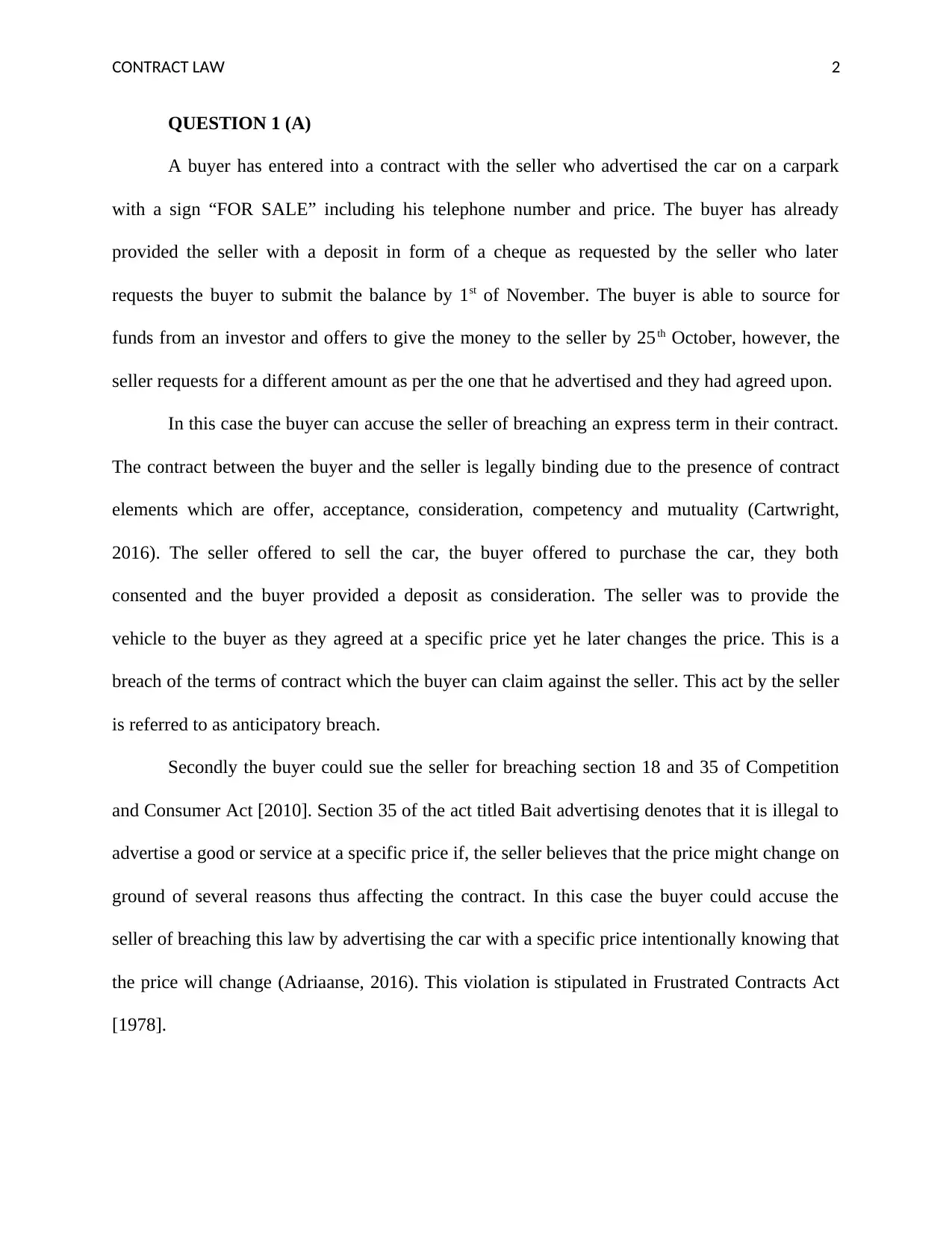
CONTRACT LAW 2
QUESTION 1 (A)
A buyer has entered into a contract with the seller who advertised the car on a carpark
with a sign “FOR SALE” including his telephone number and price. The buyer has already
provided the seller with a deposit in form of a cheque as requested by the seller who later
requests the buyer to submit the balance by 1st of November. The buyer is able to source for
funds from an investor and offers to give the money to the seller by 25th October, however, the
seller requests for a different amount as per the one that he advertised and they had agreed upon.
In this case the buyer can accuse the seller of breaching an express term in their contract.
The contract between the buyer and the seller is legally binding due to the presence of contract
elements which are offer, acceptance, consideration, competency and mutuality (Cartwright,
2016). The seller offered to sell the car, the buyer offered to purchase the car, they both
consented and the buyer provided a deposit as consideration. The seller was to provide the
vehicle to the buyer as they agreed at a specific price yet he later changes the price. This is a
breach of the terms of contract which the buyer can claim against the seller. This act by the seller
is referred to as anticipatory breach.
Secondly the buyer could sue the seller for breaching section 18 and 35 of Competition
and Consumer Act [2010]. Section 35 of the act titled Bait advertising denotes that it is illegal to
advertise a good or service at a specific price if, the seller believes that the price might change on
ground of several reasons thus affecting the contract. In this case the buyer could accuse the
seller of breaching this law by advertising the car with a specific price intentionally knowing that
the price will change (Adriaanse, 2016). This violation is stipulated in Frustrated Contracts Act
[1978].
QUESTION 1 (A)
A buyer has entered into a contract with the seller who advertised the car on a carpark
with a sign “FOR SALE” including his telephone number and price. The buyer has already
provided the seller with a deposit in form of a cheque as requested by the seller who later
requests the buyer to submit the balance by 1st of November. The buyer is able to source for
funds from an investor and offers to give the money to the seller by 25th October, however, the
seller requests for a different amount as per the one that he advertised and they had agreed upon.
In this case the buyer can accuse the seller of breaching an express term in their contract.
The contract between the buyer and the seller is legally binding due to the presence of contract
elements which are offer, acceptance, consideration, competency and mutuality (Cartwright,
2016). The seller offered to sell the car, the buyer offered to purchase the car, they both
consented and the buyer provided a deposit as consideration. The seller was to provide the
vehicle to the buyer as they agreed at a specific price yet he later changes the price. This is a
breach of the terms of contract which the buyer can claim against the seller. This act by the seller
is referred to as anticipatory breach.
Secondly the buyer could sue the seller for breaching section 18 and 35 of Competition
and Consumer Act [2010]. Section 35 of the act titled Bait advertising denotes that it is illegal to
advertise a good or service at a specific price if, the seller believes that the price might change on
ground of several reasons thus affecting the contract. In this case the buyer could accuse the
seller of breaching this law by advertising the car with a specific price intentionally knowing that
the price will change (Adriaanse, 2016). This violation is stipulated in Frustrated Contracts Act
[1978].
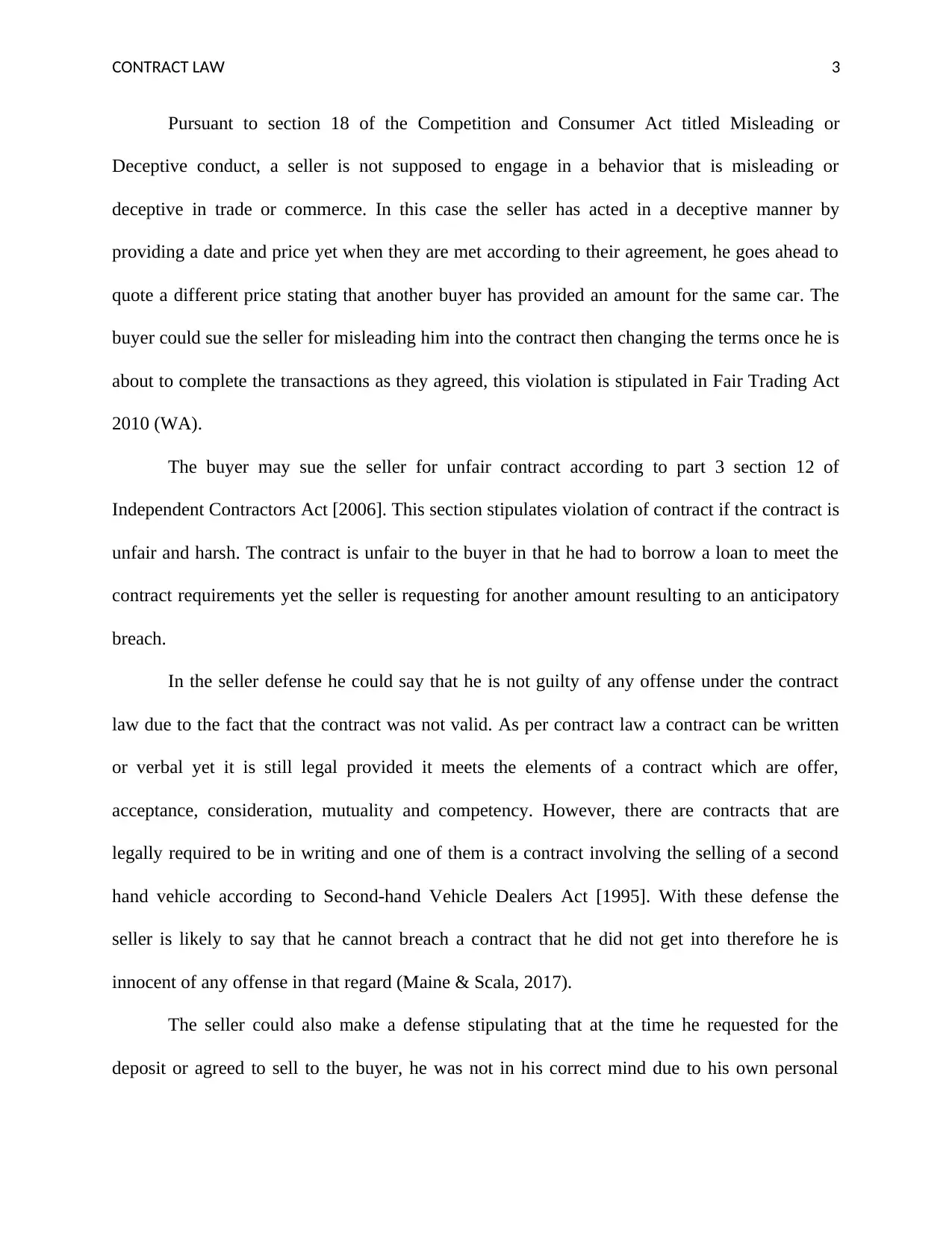
CONTRACT LAW 3
Pursuant to section 18 of the Competition and Consumer Act titled Misleading or
Deceptive conduct, a seller is not supposed to engage in a behavior that is misleading or
deceptive in trade or commerce. In this case the seller has acted in a deceptive manner by
providing a date and price yet when they are met according to their agreement, he goes ahead to
quote a different price stating that another buyer has provided an amount for the same car. The
buyer could sue the seller for misleading him into the contract then changing the terms once he is
about to complete the transactions as they agreed, this violation is stipulated in Fair Trading Act
2010 (WA).
The buyer may sue the seller for unfair contract according to part 3 section 12 of
Independent Contractors Act [2006]. This section stipulates violation of contract if the contract is
unfair and harsh. The contract is unfair to the buyer in that he had to borrow a loan to meet the
contract requirements yet the seller is requesting for another amount resulting to an anticipatory
breach.
In the seller defense he could say that he is not guilty of any offense under the contract
law due to the fact that the contract was not valid. As per contract law a contract can be written
or verbal yet it is still legal provided it meets the elements of a contract which are offer,
acceptance, consideration, mutuality and competency. However, there are contracts that are
legally required to be in writing and one of them is a contract involving the selling of a second
hand vehicle according to Second-hand Vehicle Dealers Act [1995]. With these defense the
seller is likely to say that he cannot breach a contract that he did not get into therefore he is
innocent of any offense in that regard (Maine & Scala, 2017).
The seller could also make a defense stipulating that at the time he requested for the
deposit or agreed to sell to the buyer, he was not in his correct mind due to his own personal
Pursuant to section 18 of the Competition and Consumer Act titled Misleading or
Deceptive conduct, a seller is not supposed to engage in a behavior that is misleading or
deceptive in trade or commerce. In this case the seller has acted in a deceptive manner by
providing a date and price yet when they are met according to their agreement, he goes ahead to
quote a different price stating that another buyer has provided an amount for the same car. The
buyer could sue the seller for misleading him into the contract then changing the terms once he is
about to complete the transactions as they agreed, this violation is stipulated in Fair Trading Act
2010 (WA).
The buyer may sue the seller for unfair contract according to part 3 section 12 of
Independent Contractors Act [2006]. This section stipulates violation of contract if the contract is
unfair and harsh. The contract is unfair to the buyer in that he had to borrow a loan to meet the
contract requirements yet the seller is requesting for another amount resulting to an anticipatory
breach.
In the seller defense he could say that he is not guilty of any offense under the contract
law due to the fact that the contract was not valid. As per contract law a contract can be written
or verbal yet it is still legal provided it meets the elements of a contract which are offer,
acceptance, consideration, mutuality and competency. However, there are contracts that are
legally required to be in writing and one of them is a contract involving the selling of a second
hand vehicle according to Second-hand Vehicle Dealers Act [1995]. With these defense the
seller is likely to say that he cannot breach a contract that he did not get into therefore he is
innocent of any offense in that regard (Maine & Scala, 2017).
The seller could also make a defense stipulating that at the time he requested for the
deposit or agreed to sell to the buyer, he was not in his correct mind due to his own personal
⊘ This is a preview!⊘
Do you want full access?
Subscribe today to unlock all pages.

Trusted by 1+ million students worldwide
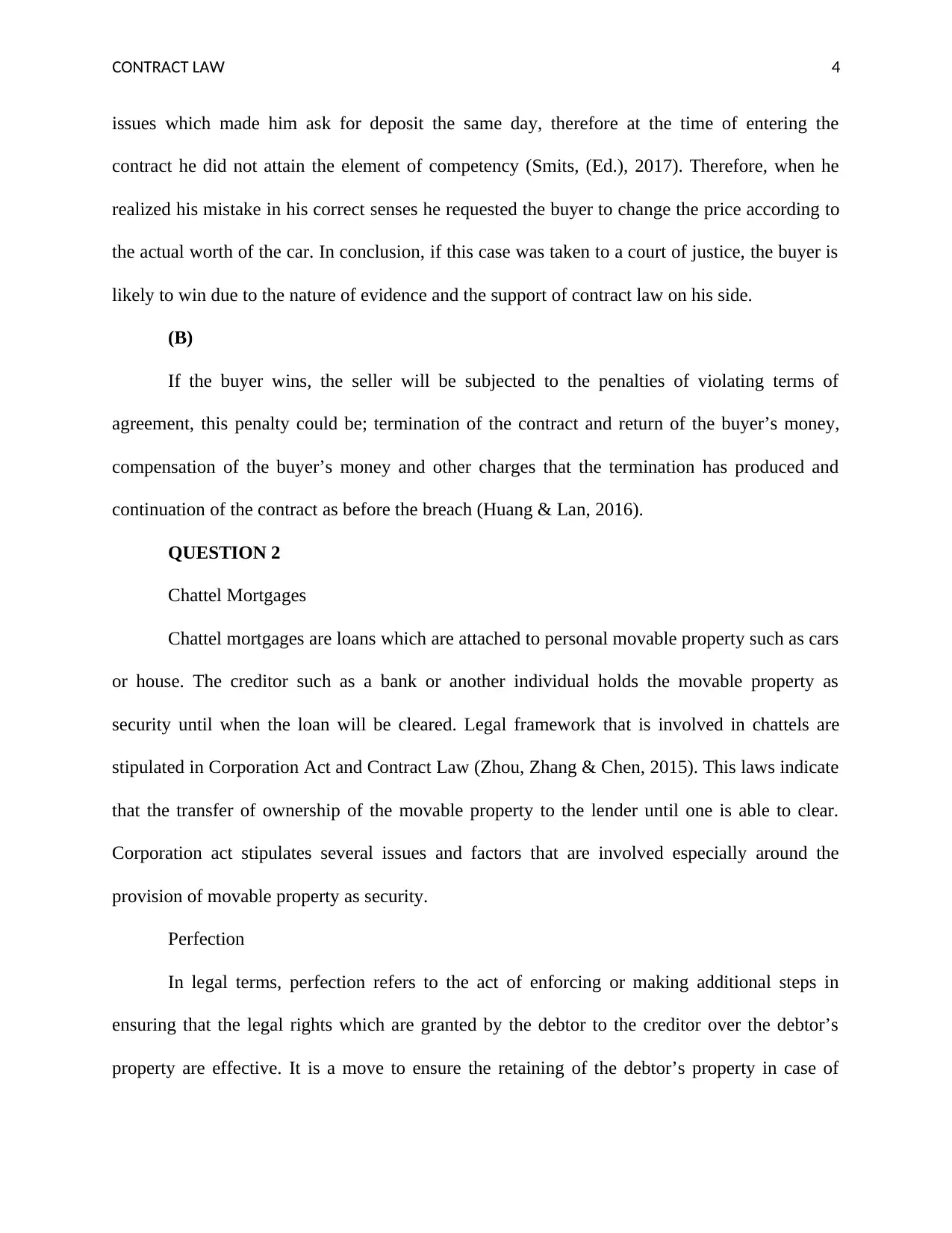
CONTRACT LAW 4
issues which made him ask for deposit the same day, therefore at the time of entering the
contract he did not attain the element of competency (Smits, (Ed.), 2017). Therefore, when he
realized his mistake in his correct senses he requested the buyer to change the price according to
the actual worth of the car. In conclusion, if this case was taken to a court of justice, the buyer is
likely to win due to the nature of evidence and the support of contract law on his side.
(B)
If the buyer wins, the seller will be subjected to the penalties of violating terms of
agreement, this penalty could be; termination of the contract and return of the buyer’s money,
compensation of the buyer’s money and other charges that the termination has produced and
continuation of the contract as before the breach (Huang & Lan, 2016).
QUESTION 2
Chattel Mortgages
Chattel mortgages are loans which are attached to personal movable property such as cars
or house. The creditor such as a bank or another individual holds the movable property as
security until when the loan will be cleared. Legal framework that is involved in chattels are
stipulated in Corporation Act and Contract Law (Zhou, Zhang & Chen, 2015). This laws indicate
that the transfer of ownership of the movable property to the lender until one is able to clear.
Corporation act stipulates several issues and factors that are involved especially around the
provision of movable property as security.
Perfection
In legal terms, perfection refers to the act of enforcing or making additional steps in
ensuring that the legal rights which are granted by the debtor to the creditor over the debtor’s
property are effective. It is a move to ensure the retaining of the debtor’s property in case of
issues which made him ask for deposit the same day, therefore at the time of entering the
contract he did not attain the element of competency (Smits, (Ed.), 2017). Therefore, when he
realized his mistake in his correct senses he requested the buyer to change the price according to
the actual worth of the car. In conclusion, if this case was taken to a court of justice, the buyer is
likely to win due to the nature of evidence and the support of contract law on his side.
(B)
If the buyer wins, the seller will be subjected to the penalties of violating terms of
agreement, this penalty could be; termination of the contract and return of the buyer’s money,
compensation of the buyer’s money and other charges that the termination has produced and
continuation of the contract as before the breach (Huang & Lan, 2016).
QUESTION 2
Chattel Mortgages
Chattel mortgages are loans which are attached to personal movable property such as cars
or house. The creditor such as a bank or another individual holds the movable property as
security until when the loan will be cleared. Legal framework that is involved in chattels are
stipulated in Corporation Act and Contract Law (Zhou, Zhang & Chen, 2015). This laws indicate
that the transfer of ownership of the movable property to the lender until one is able to clear.
Corporation act stipulates several issues and factors that are involved especially around the
provision of movable property as security.
Perfection
In legal terms, perfection refers to the act of enforcing or making additional steps in
ensuring that the legal rights which are granted by the debtor to the creditor over the debtor’s
property are effective. It is a move to ensure the retaining of the debtor’s property in case of
Paraphrase This Document
Need a fresh take? Get an instant paraphrase of this document with our AI Paraphraser
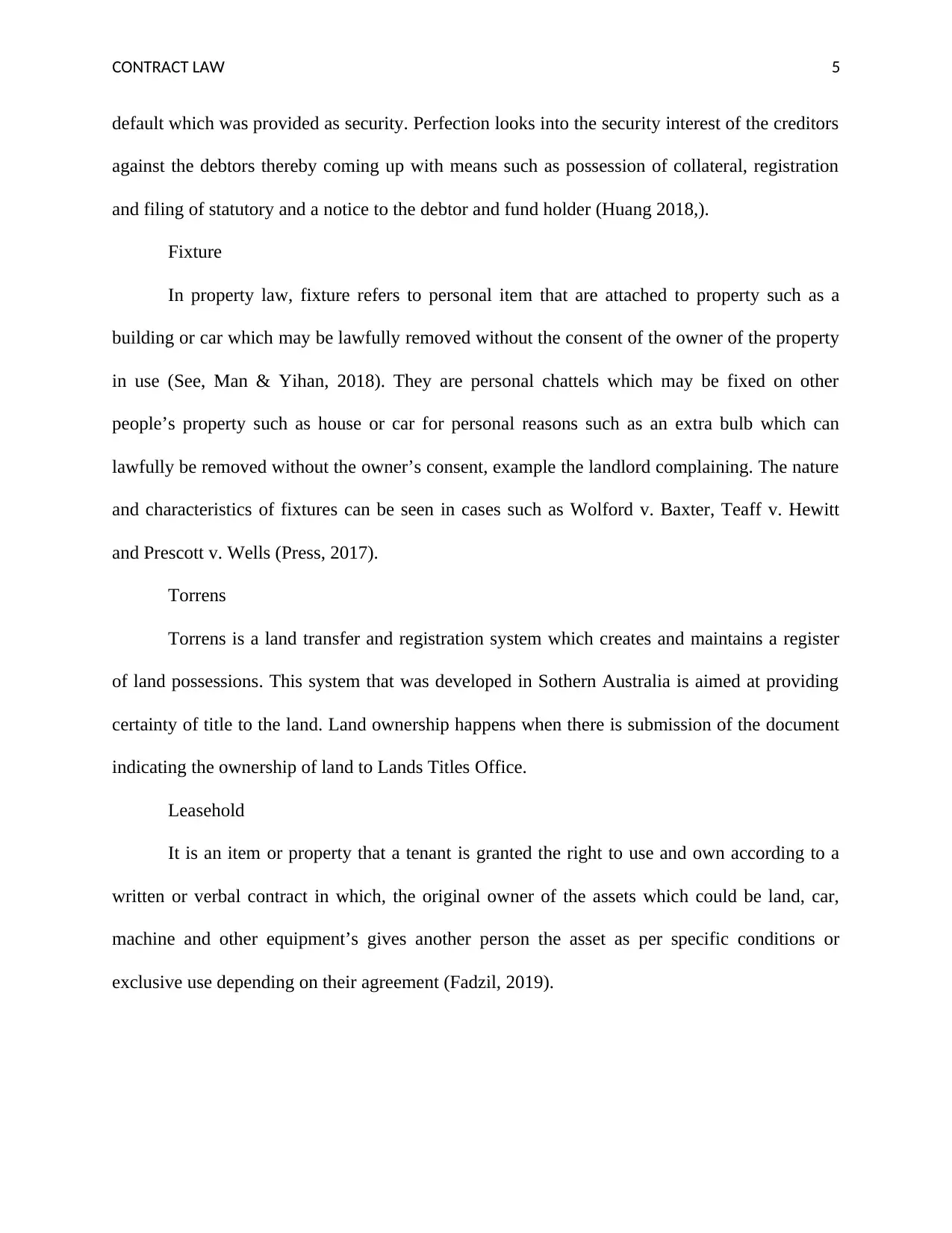
CONTRACT LAW 5
default which was provided as security. Perfection looks into the security interest of the creditors
against the debtors thereby coming up with means such as possession of collateral, registration
and filing of statutory and a notice to the debtor and fund holder (Huang 2018,).
Fixture
In property law, fixture refers to personal item that are attached to property such as a
building or car which may be lawfully removed without the consent of the owner of the property
in use (See, Man & Yihan, 2018). They are personal chattels which may be fixed on other
people’s property such as house or car for personal reasons such as an extra bulb which can
lawfully be removed without the owner’s consent, example the landlord complaining. The nature
and characteristics of fixtures can be seen in cases such as Wolford v. Baxter, Teaff v. Hewitt
and Prescott v. Wells (Press, 2017).
Torrens
Torrens is a land transfer and registration system which creates and maintains a register
of land possessions. This system that was developed in Sothern Australia is aimed at providing
certainty of title to the land. Land ownership happens when there is submission of the document
indicating the ownership of land to Lands Titles Office.
Leasehold
It is an item or property that a tenant is granted the right to use and own according to a
written or verbal contract in which, the original owner of the assets which could be land, car,
machine and other equipment’s gives another person the asset as per specific conditions or
exclusive use depending on their agreement (Fadzil, 2019).
default which was provided as security. Perfection looks into the security interest of the creditors
against the debtors thereby coming up with means such as possession of collateral, registration
and filing of statutory and a notice to the debtor and fund holder (Huang 2018,).
Fixture
In property law, fixture refers to personal item that are attached to property such as a
building or car which may be lawfully removed without the consent of the owner of the property
in use (See, Man & Yihan, 2018). They are personal chattels which may be fixed on other
people’s property such as house or car for personal reasons such as an extra bulb which can
lawfully be removed without the owner’s consent, example the landlord complaining. The nature
and characteristics of fixtures can be seen in cases such as Wolford v. Baxter, Teaff v. Hewitt
and Prescott v. Wells (Press, 2017).
Torrens
Torrens is a land transfer and registration system which creates and maintains a register
of land possessions. This system that was developed in Sothern Australia is aimed at providing
certainty of title to the land. Land ownership happens when there is submission of the document
indicating the ownership of land to Lands Titles Office.
Leasehold
It is an item or property that a tenant is granted the right to use and own according to a
written or verbal contract in which, the original owner of the assets which could be land, car,
machine and other equipment’s gives another person the asset as per specific conditions or
exclusive use depending on their agreement (Fadzil, 2019).
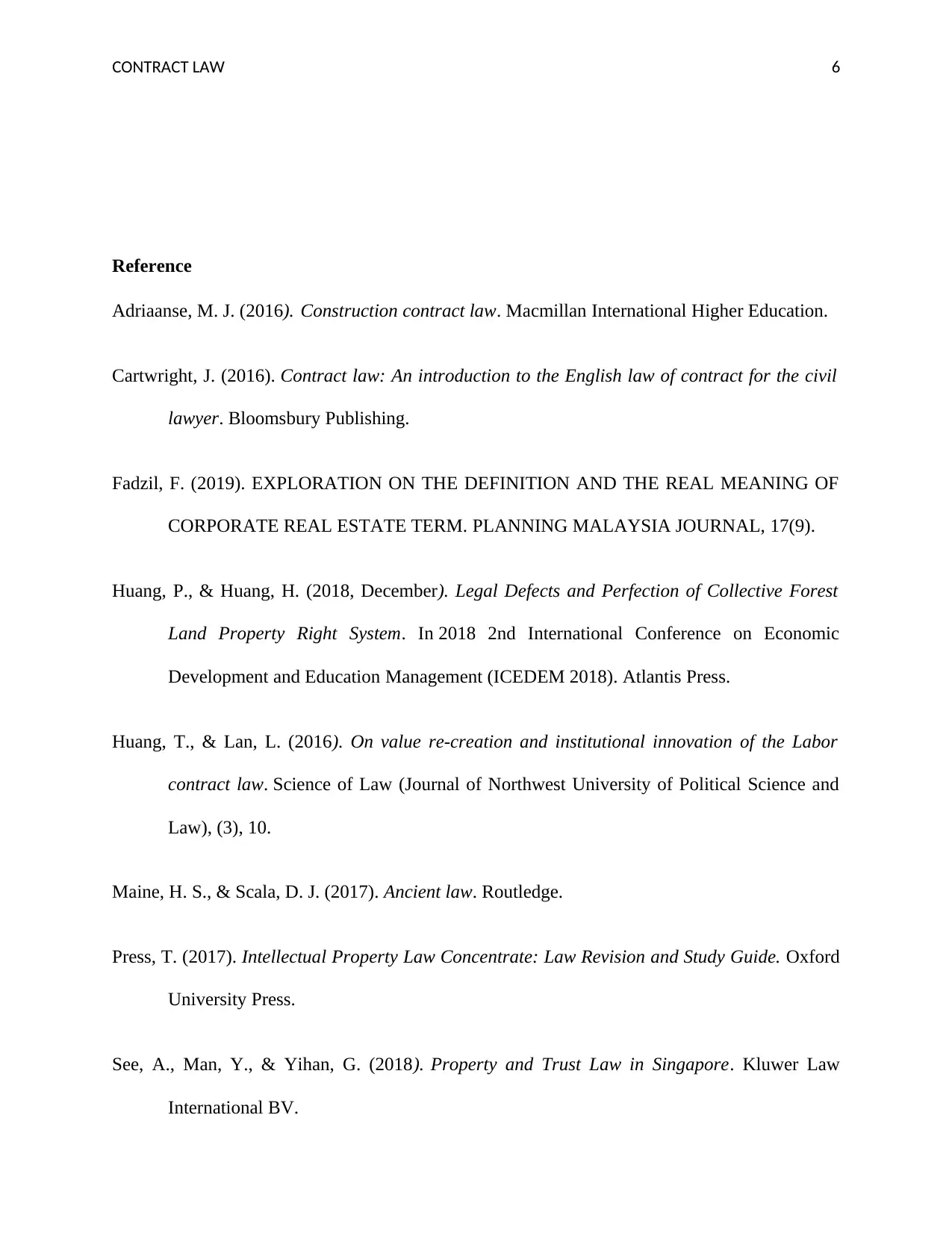
CONTRACT LAW 6
Reference
Adriaanse, M. J. (2016). Construction contract law. Macmillan International Higher Education.
Cartwright, J. (2016). Contract law: An introduction to the English law of contract for the civil
lawyer. Bloomsbury Publishing.
Fadzil, F. (2019). EXPLORATION ON THE DEFINITION AND THE REAL MEANING OF
CORPORATE REAL ESTATE TERM. PLANNING MALAYSIA JOURNAL, 17(9).
Huang, P., & Huang, H. (2018, December). Legal Defects and Perfection of Collective Forest
Land Property Right System. In 2018 2nd International Conference on Economic
Development and Education Management (ICEDEM 2018). Atlantis Press.
Huang, T., & Lan, L. (2016). On value re-creation and institutional innovation of the Labor
contract law. Science of Law (Journal of Northwest University of Political Science and
Law), (3), 10.
Maine, H. S., & Scala, D. J. (2017). Ancient law. Routledge.
Press, T. (2017). Intellectual Property Law Concentrate: Law Revision and Study Guide. Oxford
University Press.
See, A., Man, Y., & Yihan, G. (2018). Property and Trust Law in Singapore. Kluwer Law
International BV.
Reference
Adriaanse, M. J. (2016). Construction contract law. Macmillan International Higher Education.
Cartwright, J. (2016). Contract law: An introduction to the English law of contract for the civil
lawyer. Bloomsbury Publishing.
Fadzil, F. (2019). EXPLORATION ON THE DEFINITION AND THE REAL MEANING OF
CORPORATE REAL ESTATE TERM. PLANNING MALAYSIA JOURNAL, 17(9).
Huang, P., & Huang, H. (2018, December). Legal Defects and Perfection of Collective Forest
Land Property Right System. In 2018 2nd International Conference on Economic
Development and Education Management (ICEDEM 2018). Atlantis Press.
Huang, T., & Lan, L. (2016). On value re-creation and institutional innovation of the Labor
contract law. Science of Law (Journal of Northwest University of Political Science and
Law), (3), 10.
Maine, H. S., & Scala, D. J. (2017). Ancient law. Routledge.
Press, T. (2017). Intellectual Property Law Concentrate: Law Revision and Study Guide. Oxford
University Press.
See, A., Man, Y., & Yihan, G. (2018). Property and Trust Law in Singapore. Kluwer Law
International BV.
⊘ This is a preview!⊘
Do you want full access?
Subscribe today to unlock all pages.

Trusted by 1+ million students worldwide

CONTRACT LAW 7
Smits, J. M. (Ed.). (2017). Contract law: a comparative introduction. Edward Elgar Publishing.
Zhou, L., Zhang, H., & Chen, D. (2015). Analysis of the Cost and Benefit of the Combination
Product of Chattel Financing and Factoring. Global Journal of Management And
Business Research.
Smits, J. M. (Ed.). (2017). Contract law: a comparative introduction. Edward Elgar Publishing.
Zhou, L., Zhang, H., & Chen, D. (2015). Analysis of the Cost and Benefit of the Combination
Product of Chattel Financing and Factoring. Global Journal of Management And
Business Research.
1 out of 7
Related Documents
Your All-in-One AI-Powered Toolkit for Academic Success.
+13062052269
info@desklib.com
Available 24*7 on WhatsApp / Email
![[object Object]](/_next/static/media/star-bottom.7253800d.svg)
Unlock your academic potential
Copyright © 2020–2025 A2Z Services. All Rights Reserved. Developed and managed by ZUCOL.




